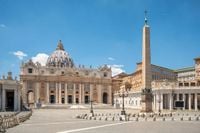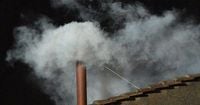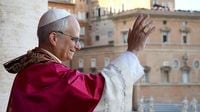On May 8, 2025, the Vatican witnessed a historic moment as white smoke billowed from the chimney of the Sistine Chapel, signaling the election of a new Pope. After two days of intense voting, the cardinals had reached a decision, and the world awaited the announcement with bated breath.
At approximately 6:00 PM local time, the news that had been anticipated by millions was confirmed. The new Pope, Robert Francis Prevost, emerged onto the balcony of St. Peter's Basilica shortly after 7:00 PM, following the traditional proclamation of "Habemus Papam!" His choice of papal name, Leon XIV, marks him as the 267th Pope in the history of the Catholic Church.
Prevost, who is 69 years old, is the first Pope from North America. Born in Chicago, he has had a long and distinguished career within the Church, serving as an Augustinian and holding various significant positions, including Prefect of the Dicastery for Bishops and Bishop of Chiclayo in Peru. His election comes in the wake of the death of Pope Francis on April 21, 2025, after a prolonged illness.
As the new Pope addressed the crowd gathered in St. Peter's Square, he expressed his vision for the Church. "We want to be a church that always strives for peace," he stated, echoing the sentiments of many who hope for a more inclusive and compassionate leadership.
The conclave, which began on May 7, 2025, involved 133 cardinal electors from 70 different countries. The process was marked by a series of votes, with the first two resulting in black smoke, indicating no decision had been reached. However, by the afternoon of May 8, the cardinals came to a consensus, and the white smoke signaled their choice.
Among the candidates were several prominent figures associated with Pope Francis's pontificate, including Cardinal Pietro Parolin and Cardinal Matteo Zuppi, both of whom were seen as potential successors. However, Prevost's election was unexpected, as he had not been widely considered a frontrunner.
Prevost's background is notable. He attended the Lower Seminary of the Augustinian Fathers and later earned a degree in mathematics from Villanova University in Pennsylvania. He then pursued theological studies at the Catholic Theological Union in Chicago and canon law at the Pontifical University of Saint Thomas Aquinas in Rome. His leadership roles have included being the superior general of the Augustinians and engaging in various missions in Peru.
His election is seen as a continuation of the progressive reforms initiated by Pope Francis, particularly in areas concerning social justice, interfaith dialogue, and the Church's role in addressing global conflicts. Prevost is expected to carry forward the legacy of his predecessor while also tackling the challenges that lie ahead, such as increasing the Church's openness to women and minorities and addressing the ongoing issues of sexual abuse within the clergy.
The atmosphere in St. Peter's Square was one of jubilation as crowds gathered to welcome their new leader. The Vatican Philharmonic Orchestra played, and the cheers of the faithful echoed around the historic square, showcasing the excitement and hope that many feel with this new papacy.
Prevost's election is particularly significant as it marks a shift in the leadership of the Catholic Church, with the first Pope from the United States taking the helm. This moment is expected to resonate not only within the Church but also in the broader context of global Catholicism, as many look to the new Pope for guidance and inspiration.
The conclave's proceedings were conducted under strict canon law, which dictates that only cardinals under the age of 80 can participate in the election of a new Pope. Despite the formal limitations, the conclave saw a diverse representation of the global Church, reflecting the universal nature of Catholicism.
The challenges facing Leon XIV are significant. He must navigate the delicate balance of maintaining the Church's traditions while also responding to the evolving needs of its members. Issues such as climate change, social inequality, and the role of the Church in geopolitical conflicts will require thoughtful and decisive leadership.
As the world reflects on the legacy of Pope Francis, who was known for his humility and focus on social issues, many will be watching closely to see how Leon XIV will shape the future of the Catholic Church. His first official acts will be closely scrutinized as he sets the tone for his papacy.
In the coming days, the new Pope will likely engage in a series of meetings with the College of Cardinals and other Church leaders to discuss the direction of the Church under his leadership. His experience in various roles within the Church will undoubtedly inform his approach to governance and reform.
As the faithful around the world celebrate the election of Leon XIV, there is a renewed sense of hope for the Catholic Church. The new Pope's commitment to peace and inclusivity resonates with many, and his leadership is seen as a potential turning point for the Church in a time of great challenge and opportunity.
In summary, the election of Robert Prevost as Leon XIV marks a significant moment in the history of the Catholic Church, one that promises to bring both continuity and change. The faithful eagerly await the unfolding of his papacy and the impact it will have on the global Church.

![Wierni witają nowego papieża. Tłumy ludzi na placu Świętego Piotra [ZDJĘCIA]](https://thumbor.evrimagaci.org/DxHCoyXOZLpAHxucHGb4dYpKkOg=/200x0/tpg%2Fsources%2F48e80779-26c6-442f-9edf-62254ab21fcc.jpeg)


